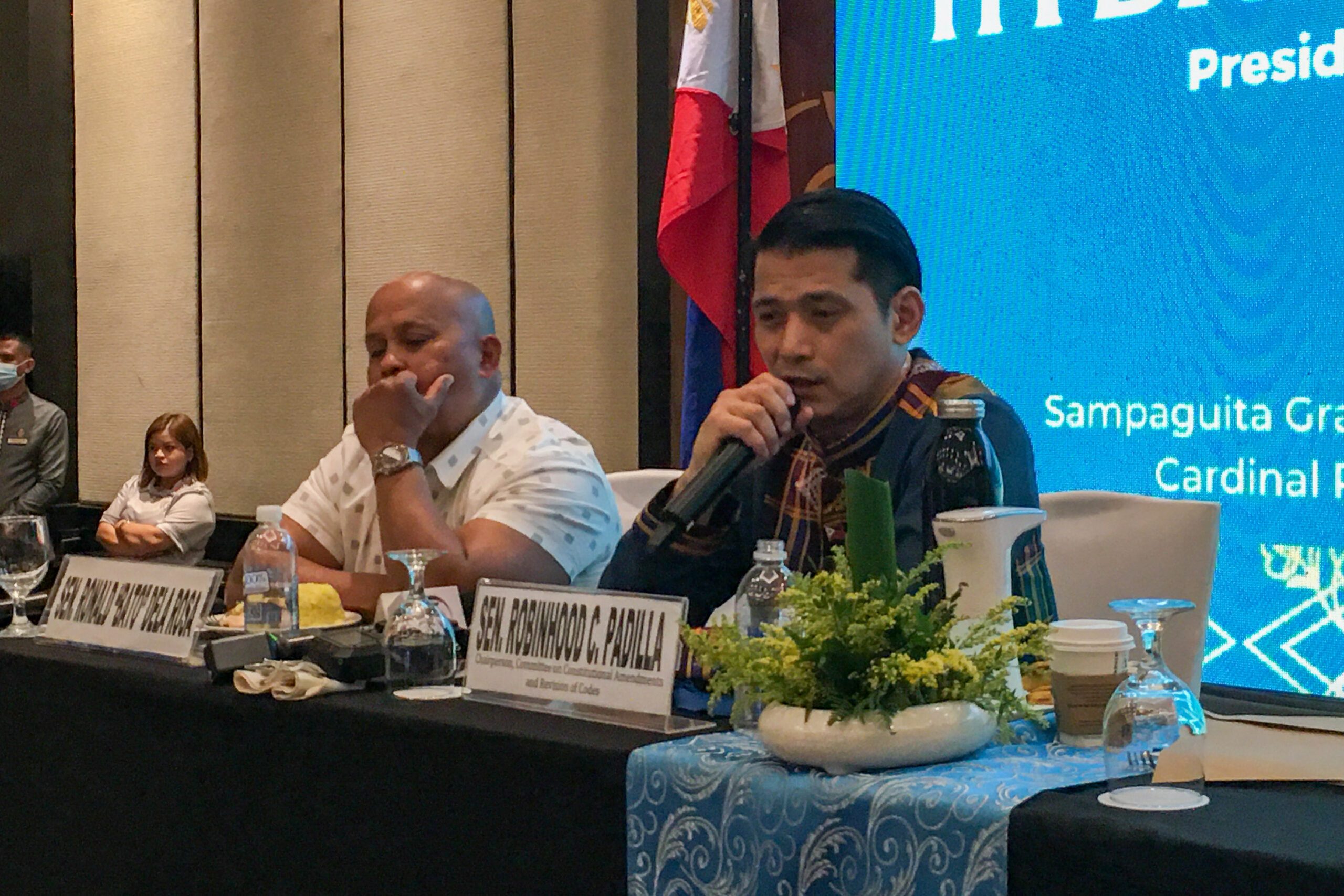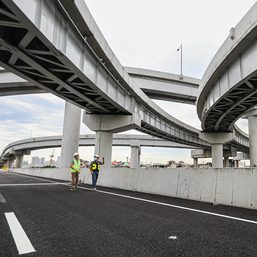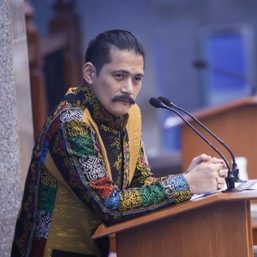SUMMARY
This is AI generated summarization, which may have errors. For context, always refer to the full article.

CEBU CITY, Philippines – Local officials and business leaders in Cebu expressed optimism that proposed amendments to economic provisions in the 1987 Constitution will attract foreign investments during a public hearing held by the Senate Committee on Constitutional Amendments and Revision of Codes on Thursday, March 16.
The hearing, chaired by Senator Robinhood Padilla, was attended by Senator Ronald Dela Rosa and members of various sectors, including industry association heads, barangay chairpersons, and small business owners.

Calixto Chikiamco, an economist from the Foundation for Economic Freedom, said the country has the most concentrated economy in Asia, with a dominance of monopolies due to restrictions set by the post-Edsa Revolution charter on foreign company entry, preventing healthy competition.
He said foreign investments would increase competition and benefit consumers by providing more choices, generating more job opportunities, and enhancing services.
Philippine Retailers Association in Cebu president Christian Paroan supported calls to allow foreign investors to fully own properties locally, particularly in public utilities such as transportation, logistics, water, communication, and power, which he said would create a level playing field.
Cebu City Mayor Michael Rama expressed support for Padilla’s proposed constitutional amendments, saying changes were needed “for the future of the Sugbuanons.”
Rama also proposed more appointed delegates to the proposed constitutional convention (Concon) to ensure that new provisions are properly implemented and that foreign investments would genuinely benefit citizens.
Cagayan de Oro 2nd District Representative Rufus Rodriguez, Padilla’s counterpart in the House of Representatives, has proposed that 50 Concon delegates be appointed by the President on top of those who would be elected per congressional district.
Challenges
Virgilio Espeleta, a former president of the Cebu Chamber of Commerce and Industry, said there was a need to open the local market to foreign competitors. He pointed out that a favorable investment climate was essential to attract foreign direct investments (FDIs).
But he said there were other challenges that need to be addressed.
“In our survey, the following are the hurdles: the government bureaucracy, elements of corruption, the lack of infrastructure which is physical as well as the technological infrastructure, and of course, access to raw materials,” Espeleta said.
The proposed amendments would allow foreigners to buy private lands not exceeding 1,000 square meters, and foreign-owned corporations to acquire rural private lands not exceeding five hectares in FDI areas.
Land reclamation projects by private or foreign companies, however, have raised concerns among environmental protection agencies and human rights advocates in some parts of the country.
In Catmon town, Cebu, there has been apprehension over a proposed reclamation project that would potentially increase foreign investments but also jeopardize the livelihood of residents.
Padilla reassured the public that lawmakers would protect them. Even after land reclamation, he said, “the foreigners won’t be able to bring the land back to their own countries.”
Significant gaps
Padilla asserted at the start of the Cebu public hearing that restrictions preventing large foreign investments have resulted in significant gaps in progress in the country’s economy.
He has introduced Resolution of Both Houses No. 3, which seeks to amend economic provisions of the 1987 Constitution, including easing restrictions on foreign investments and allowing private land acquisition by foreign-owned corporations. The proposed changes, he said, would shape the future of the country.
Padilla said the country has been very restrictive, especially toward foreign equity ownership, which made it unattractive to non-Filipino investors.
The senator cited a report by Oxford Economics, which ranked the Philippines second to last among 14 Asia-Pacific economies in terms of attractiveness to foreign direct investment, due to poor infrastructure and competitiveness rankings.
Padilla also pointed out that the Philippines only had $48.7 billion worth of net FDI from 2011 to 2018, compared to Vietnam’s $87.9 billion during the same period.
Based on data from the Bangko Sentral ng Pilipinas, the net inflows of FDI in the country dropped to $9.2 billion in 2022 from $12 billion in 2021.
Cebu is the third province to be visited by Padilla’s committee for consultative meetings on the proposed amendments, following Baguio and Davao. – Rappler.com
John Sitchon is an Aries Rufo Journalism fellow.
Add a comment
How does this make you feel?








![[ANALYSIS] Why do we pay higher power rates when we have power outages?](https://www.rappler.com/tachyon/2024/07/tl-higher-power-rates-higher-power-outages.jpg?resize=257%2C257&crop=401px%2C0px%2C1080px%2C1080px)
![[Vantage Point] Philippine economic reforms run into headwinds](https://www.rappler.com/tachyon/2024/05/ph-economic-headwind-may-2024.jpg?resize=257%2C257&crop_strategy=attention)
![[ANALYSIS] Promoting PPP via a sufficiently empowered media](https://www.rappler.com/tachyon/2024/04/PPP-and-media.jpg?resize=257%2C257&crop=365px%2C0px%2C720px%2C720px)
![[In This Economy] Here’s a new paper by UP economists on economic charter change](https://www.rappler.com/tachyon/2024/04/TL-foreign-direct-investments-apr-12-2024.jpg?resize=257%2C257&crop=299px%2C0px%2C720px%2C720px)






![[Just Saying] SONA, Congress, accountability, and free speech](https://www.rappler.com/tachyon/2024/07/TL-SONA-congress-accountability-free-speech.jpg?resize=257%2C257&crop=330px%2C0px%2C1080px%2C1080px)
![[Just Saying] Reciting a hymn and pledge: Illegal, punitive, unconstitutional](https://www.rappler.com/tachyon/2024/06/20240612-reciting-hymn-pledge-unconstitutional.jpg?resize=257%2C257&crop=338px%2C0px%2C720px%2C720px)
![[Just Saying] Demonizing divorce and the mockery of our Constitution](https://www.rappler.com/tachyon/2024/06/TL-Demonizing-divorce-mocking-constitution-June-6-2024.jpg?resize=257%2C257&crop=265px%2C0px%2C720px%2C720px)
![[ANALYSIS] A Rube Goldberg cartoon of our inconvenient reality](https://www.rappler.com/tachyon/2024/05/tl-inconvenient-reality-05092024.jpg?resize=257%2C257&crop=280px%2C0px%2C720px%2C720px)

![[EDITORIAL] Bakit hindi mahuli-huli si Apollo Quiboloy?](https://www.rappler.com/tachyon/2024/04/animated-quiboloy-investigation-april-2024-carousel-edit.jpg?resize=257%2C257&crop_strategy=attention)

![[Vantage Point] Beware of false prophets: A cautionary examination](https://www.rappler.com/tachyon/2024/03/tl-false-prophet.jpg?resize=257%2C257&crop=272px%2C0px%2C720px%2C720px)
![[EDITORIAL] Kalaban mo ang mga senador na protektor ni Quiboloy](https://www.rappler.com/tachyon/2024/03/animated-quiboloy-kojc-senate-carousel.jpg?resize=257%2C257&crop=365px%2C0px%2C720px%2C720px)




![[WATCH] Bamban POGO scandal: There’s a bigger fish than Alice Guo](https://www.rappler.com/tachyon/2024/07/inside-track-tcard-bamban-pogo.jpg?resize=257%2C257&crop=435px%2C0px%2C1080px%2C1080px)
There are no comments yet. Add your comment to start the conversation.